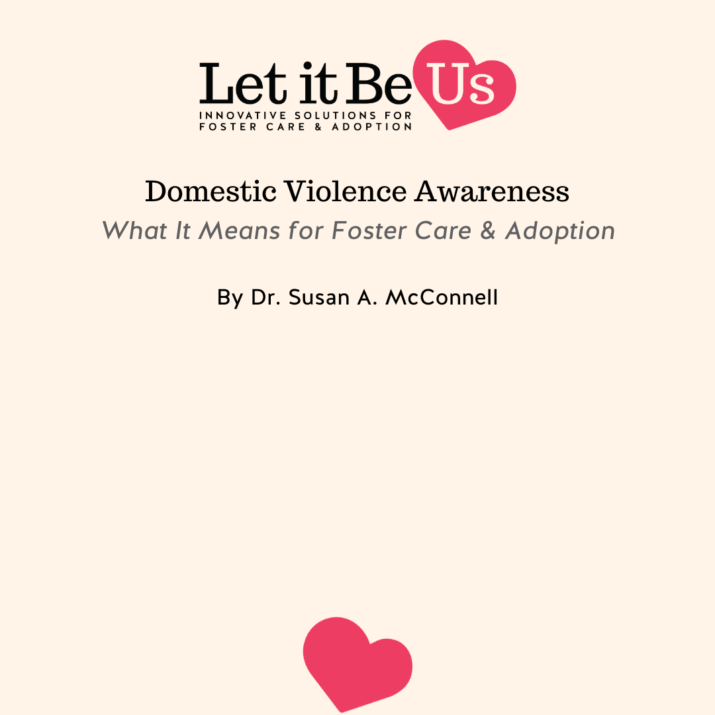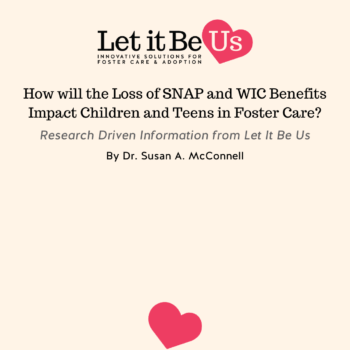Domestic Violence Awareness: What It Means for Foster Care & Adoption – Let It Be Us
- Latest News
- October 30, 2025

Domestic Violence Awareness: What It Means for Foster Care & Adoption – Let It Be Us
It is important to raise awareness about the prevalence, causes and consequences of intimate partner and domestic violence, and to galvanize action and understanding in our communities. For those working in child welfare, foster care and adoption, we need to view domestic violence through a critical lens: when violence destabilizes homes, children are at heightened risk of entering the foster-care system, where they may struggle to ultimately find permanency, or aging out without the support they need.
At Let It Be Us, we believe that every child deserves a safe, stable, loving home. To fulfill that promise, we must understand how domestic violence intersects with child welfare, and how recruitment, matching and placement of families must respond accordingly. Below, we have rounded up important research that will be of interest to our multiple communities:
The Landscape of Domestic Violence in the U.S.
- More than 1 in 3 women (35.6 %) and 1 in 4 men (28.5 %) in the U.S. have experienced rape, physical violence, and/or stalking by an intimate partner at some point in their lives. The Hotline+2Law Office Of Louis J. Goodman+2
- Over 61 million women and 53 million men have experienced psychological aggression by an intimate partner in their lifetime. CDC
- Every year, more than 10 million adults in the U.S. become victims of domestic violence. Dolan + Zimmerman LLP+1
- Violence is not only physical: it often includes emotional abuse, financial control, isolation and stalking—especially in communities already coping with structural disadvantage. Department of Justice+1
These numbers are profound on their own, but when we connect them to foster-care entries, youth outcomes and the adoption pipeline, the ripple effects become stark, long-lasting, and ultimately generational.
Foster Care, Adoption & the Impact of Trauma
- On any given day, there are more than 400,000 children in foster care in the United States. AdoptUSKids+1
- In Fiscal Year (FY) 2023, there were 50,193 children adopted from foster care. National Council For Adoption+1
- At the end of FY 2023, about 36,411 children were legally free and waiting for adoption. National Council For Adoption
- Among children awaiting adoption: 54 % were ages 1–5, 25 % were ages 6–10, and 17 % were ages 11–16. National Council For Adoption
- For exits from foster care in the same year: only 44 % reunified with their families; 27 % were adopted; 10 % exited to guardianship; and 15,590 youth aged out without a permanent family. National Council For Adoption
The connection is clear: many children entering foster care have experienced family disruption, neglect or abuse, often linked to domestic violence. The trauma of witnessing or being exposed to violence increases risks of removal, placement instability, behavioral and educational challenges, and impacted permanency.
Why Domestic Violence Awareness Matters for Adoption & Recruitment
- Recognizing root causes: Domestic violence is a key driver of child-welfare involvement. Families experiencing IPV (intimate partner violence) often operate under extreme stress, mental health challenges, housing & economic instability, all of which undermine safe parenting and increase risk of entry to foster care.
- Trauma-informed foster and adoptive home recruitment and placement: When recruiting adoptive or foster homes, we must consider the legacy of trauma for children coming from violent or unstable homes. That means preparing families for issues like attachment, behavioral dysregulation, complex trauma, and helping them understand how early violence impacts brain development and relational health.
- Matching with sensitivity: Because children with trauma histories often wait longer for placement, our systems must be flexible and creative. Families who are trauma-informed, willing to adopt older youth or sibling groups, and equipped with resources have the greatest potential to change outcomes.
- Advocacy & prevention: Participating in DVAM isn’t just symbolic, it’s strategic. By raising awareness, we shine light on a root cause of foster-care entry. Supporting DV prevention, safe housing for survivors, economic stability and community resources helps reduce the pipeline into foster care.
Action Steps for Our Community
- Wear purple, share the message: Use your networks (social media, Newsletter, board communications) to share key facts about domestic violence and child-welfare intersections.
- Host a trauma-informed training: For staff, foster/adoptive parents, kinship caregivers, offer a session on how domestic violence impacts children’s development, attachment and behaviors.
- Build a “DV-aware” foster-home pipeline: Actively recruit families prepared to work with children who have witnessed violence; highlight this as a niche speciality and provide support. Let It Be Us can work with you to set up a recruitment event for your community. Contact Cathy Newbury, Director of Foster Home Recruitment at cathynewbury@letitbeus.org.
- Partner with DV-survivor services: Strengthen collaborations with local domestic violence shelters, legal services, and family-stabilisation programs – these can be prevention touch points and recruitment partners.
- Update dashboards & metrics: Include indicators such as: number of children in care with domestic-violence exposure; number of adoptive/foster homes trained in trauma competence; time-to-placement for children with DV-related trauma histories.
A Call to Hope & Possibility
For children who have lived with fear, instability or loss due to domestic violence, the journey through foster care and adoption can feel endless. But they deserve more than resilience, they deserve a thriving future. By anchoring our work in trauma awareness, recruitment excellence, and strategic partnerships, we turn awareness into action.
Let’s commit to standing with survivors, preparing families, and ensuring that every child in Illinois … and nationwide … has the chance to land in a home filled with safety, stability and unconditional love.
Let It Be Us invites you to be part of this mission: as a supporter, as a prospective family, as an advocate. Together we can transform the statistics into stories of hope.
Let It Be Us can work with you to set up a recruitment event for your community. Contact Cathy Newbury, Director of Foster Home Recruitment at cathynewbury@letitbeus.org.
If you are experiencing violence and need help, the Domestic Violence Hotline is available 24/7 online or by calling 1.800.799.SAFE (7233)
About Let It Be Us:
Let It Be Us is a nonprofit organization dedicated to recruitment, matching and placement within foster care and adoption across the State of Illinois. Through innovative programming and strategic partnerships, Let It Be Us aims to improve outcomes for children in the child welfare system. Learn more at www.letitbeus.org.

Dr. Susan A. McConnell is the Founder and Executive Director of Let It Be Us, an Illinois licensed child welfare agency with the mission of providing collaborative, innovative solutions of effective recruitment and placement within Illinois foster care and adoption. Susan has an MBA from DePaul University and a Doctorate Degree in Social Work from the University of Southern California, where her work focused on permanency within child welfare. She is the Chair of the Permanency Committee of the Illinois Statewide Foster Care Advisory Council, appointed by the Director of the Illinois Department of Children and Family Services (DCFS) in 2017. She is also an adoptive parent with over 30 years of open adoption experience. She can be reached at susanmcconnell@letitbeus.org.
Let It Be Us is an Illinois 501(c)3 and licensed child welfare agency. The mission of Let It Be Us is to provide collaborative, innovative solutions of effective recruitment and placement within Illinois foster care and adoption. The Let It Be Us platform manages the Adoption Listing Service of Illinois and the Heart Gallery of Illinois, engines of success for Illinois foster care adoptions. The Let It Be Us vision is for all children in the Illinois child welfare system to achieve educational equity, employment equity, and overall well being through the incorporation of Let It Be Us Programming into statewide advancements in foster care and adoption recruitment and placement. For more information about Let It Be Us, visit www.letitbeus.org.


